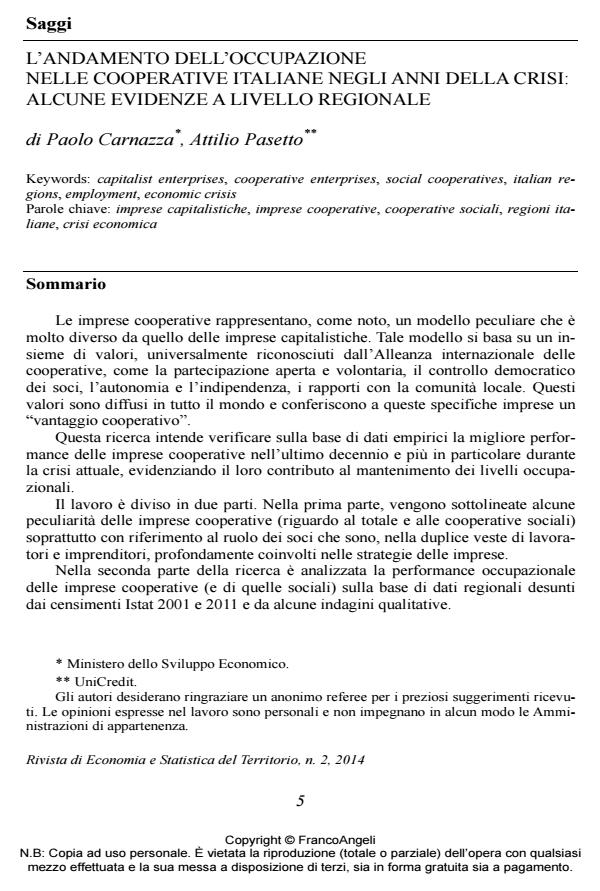L’andamento dell’occupazione nelle cooperative italiane negli anni della crisi: alcune evidenze a livello regionale
Titolo Rivista RIVISTA DI ECONOMIA E STATISTICA DEL TERRITORIO
Autori/Curatori Paolo Carnazza, Attilio Pasetto
Anno di pubblicazione 2014 Fascicolo 2014/2
Lingua Italiano Numero pagine 29 P. 5-33 Dimensione file 659 KB
DOI 10.3280/REST2014-002001
Il DOI è il codice a barre della proprietà intellettuale: per saperne di più
clicca qui
Qui sotto puoi vedere in anteprima la prima pagina di questo articolo.
Se questo articolo ti interessa, lo puoi acquistare (e scaricare in formato pdf) seguendo le facili indicazioni per acquistare il download credit. Acquista Download Credits per scaricare questo Articolo in formato PDF

FrancoAngeli è membro della Publishers International Linking Association, Inc (PILA)associazione indipendente e non profit per facilitare (attraverso i servizi tecnologici implementati da CrossRef.org) l’accesso degli studiosi ai contenuti digitali nelle pubblicazioni professionali e scientifiche
Le imprese cooperative rappresentano, come noto, un modello peculiare che è molto diverso da quello delle imprese capitalistiche. Tale modello si basa su un insieme di valori, universalmente riconosciuti dall’Alleanza internazionale delle cooperative, come la partecipazione aperta e volontaria, il controllo democratico dei soci, l’autonomia e l’indipendenza, i rapporti con la comunità locale. Questi valori sono diffusi in tutto il mondo e conferiscono a queste specifiche imprese un "vantaggio cooperativo". Questa ricerca intende verificare sulla base di dati empirici la migliore performance delle imprese cooperative nell’ultimo decennio e più in particolare durante la crisi attuale, evidenziando il loro contributo al mantenimento dei livelli occupazionali. Il lavoro è diviso in due parti. Nella prima parte, vengono sottolineate alcune peculiarità delle imprese cooperative (riguardo al totale e alle cooperative sociali) soprattutto con riferimento al ruolo dei soci che sono, nella duplice veste di lavoratori e imprenditori, profondamente coinvolti nelle strategie delle imprese. Nella seconda parte della ricerca è analizzata la performance occupazionale delle imprese cooperative (e di quelle sociali) sulla base di dati regionali desunti dai censimenti Istat 2001 e 2011 e da alcune indagini qualitative.
Parole chiave:Imprese capitalistiche, imprese cooperative, cooperative sociali, regioni italiane, crisi economica
Jel codes:J21, L21, L31, P12, P13
Paolo Carnazza, Attilio Pasetto, L’andamento dell’occupazione nelle cooperative italiane negli anni della crisi: alcune evidenze a livello regionale in "RIVISTA DI ECONOMIA E STATISTICA DEL TERRITORIO" 2/2014, pp 5-33, DOI: 10.3280/REST2014-002001